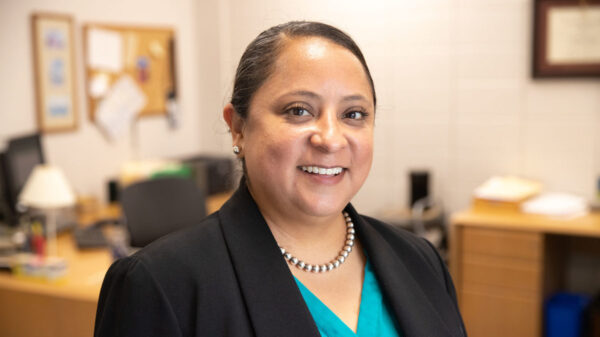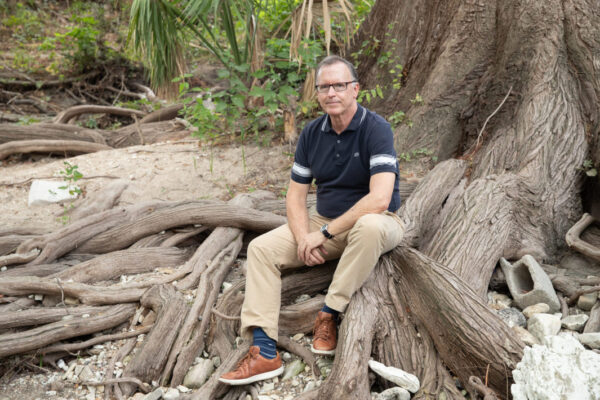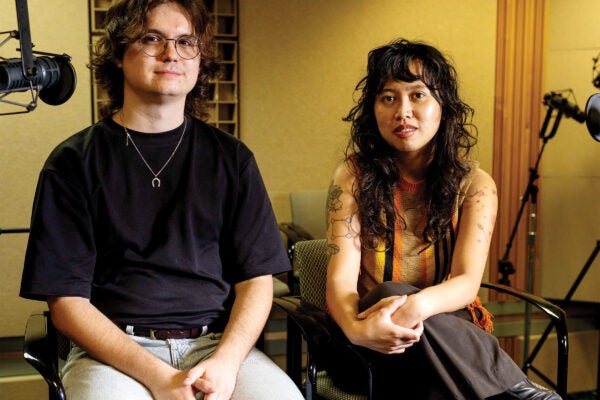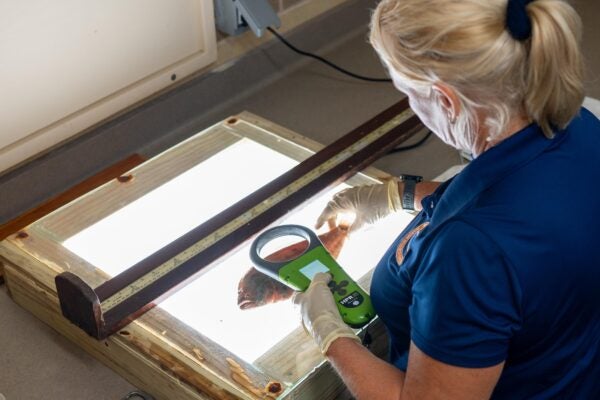When 7-year-old Matt Turner sat down at the dinner table, his father, botanist Billie Turner, would ask him to name the plant families on his plate before he began to eat.
As he grew older, he helped his father, who was chairman of the Department of Botany at The University of Texas at Austin from 1967 to 1974 and later the director of UT’s Plant Resources Center, with research and was even published in botanical journals. For an undergraduate junior fellow project, the UT Plan II major studied the history of the sunflower.
Turner says he remembers kicking himself later during graduate programs — at Harvard for a master’s in romance languages and then Yale for a doctorate in comparative literature — wondering why he hadn’t chosen a project topic within these fields instead.
“I’m a humanist, and literature is more interesting to me,” he says.
Turner, 59, is now a marketing researcher at the McCombs School of Business. Every day, he dives deep into data from U.S. News & World Report and Financial Times, gathering external media rankings of the school’s undergraduate, master’s and doctoral programs.
But Turner has not completely escaped his inherited fascination with nature. Outside his office — his first with a window, he says — clouds roll behind the Tower, which houses a massive collection of preserved plant specimens, renamed the Billie L. Turner Plant Resources Center after his father in 2017. Inside his office, Matt Turner prepares lectures for the Human Place in Nature, the class he now teaches in addition to the work he does in his staff position.
Turner took his first job with the university in 1992 as a coordinator for the international exchange programs at McCombs. From there, he climbed the career ranks in administration at the school. By 2001, he was working 70-hour weeks as the MBA admissions director.
But in 2004, a preplanned work hiatus and the need to care for his dying mother pulled him away from the role. During that break, what Turner calls his “midlife crisis,” he turned an idea he had been toying with into a book, “Remarkable Plants of Texas: Uncommon Accounts of Our Common Natives.”
“It’s the history of the sunflower times 65,” Turner says. “It’s essentially my dad’s field, but the human-interest side: Why should you pay attention to these plants?”
After his hiatus, Turner says he considered freelance writing. And then, in 2007, a research position at McCombs appeared on UT’s job site.
Turner was skeptical, he says, but applied anyway. Upon getting the job, he says he was surprised by how quickly he enjoyed the work.
“Staring at a spreadsheet for five hours bores the hell out of most people,” Turner says.
But, he says, he liked being solitary: “Most writers are kind of introverted, quiet, thoughtful, reflective people.”
In 2014, he met Larry Carver, then-director of the College of Liberal Arts Honors Program, who told him the program was always looking for new teachers. Turner put together proposals for literature-based classes, but he says Carver was more interested in the analyst’s book.
So Turner again combined his passions for literature and nature. He discovered the Association for the Study of Literature and Environment — in his words, a bunch of “frustrated English teachers that would rather be hiking.”
Then he constructed his course, with the aim to understand how society’s attitude toward nature has changed over time and to answer seemingly simple questions such as, “Why do we feel different when we go outside?”
Turner says the lecturing “has absolutely nothing to do with” his desk job. “But the literature part, I have deep roots in, and the nature part, I have deep roots in,” he says.
His father, whom Turner visits every day in assisted living, says he is proud to see his son integrate these topics.
“It’s extraordinary,” Billie Turner, 94, says. “He does what he loves to do.”
Since 2016, Matt Turner has taught his liberal arts honors course every spring. He says he does not see himself leaving either of his roles at the university anytime soon.
“There’s nothing better,” Turner says, “than talking about something you love with 17 smart, engaging, happy, wrinkle-free undergraduates who still have their whole lives ahead of them.”

Elida Lee, director for Organization Effectiveness at UT, has been a staff member at the university for two decades. In the fall of 2019, she became a faculty member, too.
Lee first joined Human Resources in 1999 as an instructional designer. That job evolved over the years and began to include more training and consulting, she says. During this time, she took advantage of the Staff Educational Benefit and pursued a doctorate in education. As she completed this program, the director role she now holds opened up, she says.
Lee and her team offer organizational consulting services and programming for campus. Their consulting areas include organizational health and productivity, continuous improvement, strategic planning and change management, among other services.
In the fall of 2018, Lee and her team taught a series of sessions for faculty members in the College of Liberal Arts. After talking with Art Markman, the founding director of the Human Dimensions of Organizations program, she proposed an idea for a course.
Within a year, she was teaching Organizational Learning, a class about how individuals and structured groups learn.
“It happened fast,” Lee says. “It’s a lot of work at this point, but it’s very rewarding.”
Lee says her lecture content often intersects with her full-time work.
“When I’m researching something for my job, I can pull that out and put it in the class. And vice versa,” she says.
The course is applicable to broader issues in our communities, Lee says.
“It actually helps us remain agile and relevant in an ever-changing environment,” she says.
Lee says she has learned much from her students and has enjoyed teaching so far. “I’m just amazed at how smart they are and how curious they are.”



